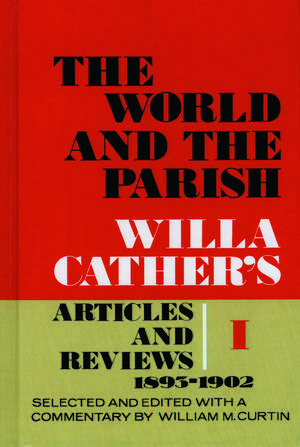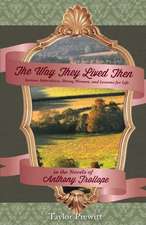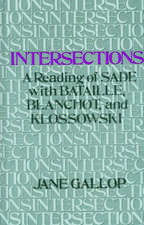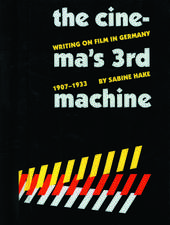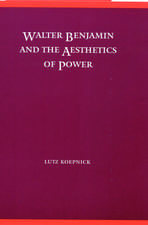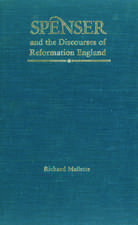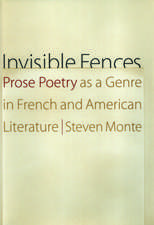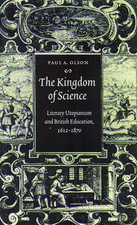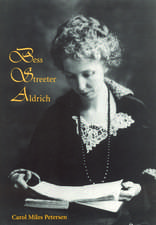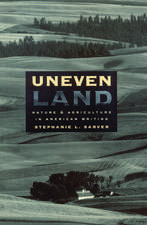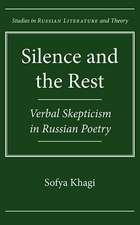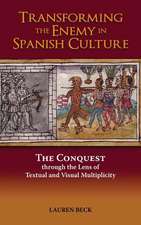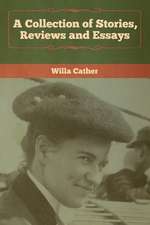The World and the Parish, Volume 1: Willa Cather's Articles and Reviews, 1893-1902
Autor Willa Cather Editat de William M. Curtinen Limba Engleză Hardback – 28 feb 1970
"One of the few really helpful words I ever heard from an older writer," Willa Cather declared in 1922, "I had from Sarah Orne Jewett when she said to me: 'Of course, one day you will write about your own country. In the meantime, get all you can. One must know the world so well before one can know the parish.'" Although Cather's first novel about her own country, O Pioneers!, did not appear until 1913, the process of knowing the world and of mastering her craft, so far as it can be traced in her published writing, already had been going on for some twenty years. The World and the Parish: Willa Cather's Articles and Reviews, 1893-1902, is the fourth in a series collecting the work of these years of experiment and discovery. More specifically, it offers a representative collection of Cather's nonfiction writing for newspapers and periodicals during her first decade as a professional writer.
Selected from 520 articles and columns, the text is divided into three parts corresponding to major developments in Cather's career—the period from 1893 to 1896 when she first began to write regularly for Lincoln newspapers; the years in Pittsburgh when she was working for the Home Monthly and the Leader and sending her famous "Passing Show" column back to Nebraska; and the period from the spring of 1900 to 1903, when she freelanced in Pittsburgh and Washington, taught in a Pittsburgh high school, and made her first trip abroad. The text has been edited with three main objectives: 1) to enable the reader to trace Cather's development as a writer; 2) to group the material so that the reader interested in a particular subject—the theatre, or music, or literature, for example—can readily locate pertinent selections; and 3) to provide a context sufficient to relate these pieces to Willa Cather's life and to the times, and to suggest some of their connections with the body of her work. Chronologies have been included for each of the three parts; and the Bibliography is the most complete yet available for the for the nonfiction writing up to 1903.
Not the least remarkable feature of this collection is the range and variety of forms and subject matter—reviews (of books, plays, operas, concerts, art exhibits, lectures), feature stories, interviews, straight reportage, columns of miscellaneous comment, and travel letters. Seemingly, with no apparent effort Willa Cather could adjust her sights to any assignment and any audience. And if it is astonishing that she could write so much about so many matters at so many levels, it is perhaps even more astonishing that so much of it was so good. Undeniably, however, the chief interest to the general reader and the peculiar value to the scholar of these journalistic writings reside in their manifold and crucial connections with Cather's later work and in the unparalleled insights they afford into the process by which a gifted writer becomes a great artist.
Selected from 520 articles and columns, the text is divided into three parts corresponding to major developments in Cather's career—the period from 1893 to 1896 when she first began to write regularly for Lincoln newspapers; the years in Pittsburgh when she was working for the Home Monthly and the Leader and sending her famous "Passing Show" column back to Nebraska; and the period from the spring of 1900 to 1903, when she freelanced in Pittsburgh and Washington, taught in a Pittsburgh high school, and made her first trip abroad. The text has been edited with three main objectives: 1) to enable the reader to trace Cather's development as a writer; 2) to group the material so that the reader interested in a particular subject—the theatre, or music, or literature, for example—can readily locate pertinent selections; and 3) to provide a context sufficient to relate these pieces to Willa Cather's life and to the times, and to suggest some of their connections with the body of her work. Chronologies have been included for each of the three parts; and the Bibliography is the most complete yet available for the for the nonfiction writing up to 1903.
Not the least remarkable feature of this collection is the range and variety of forms and subject matter—reviews (of books, plays, operas, concerts, art exhibits, lectures), feature stories, interviews, straight reportage, columns of miscellaneous comment, and travel letters. Seemingly, with no apparent effort Willa Cather could adjust her sights to any assignment and any audience. And if it is astonishing that she could write so much about so many matters at so many levels, it is perhaps even more astonishing that so much of it was so good. Undeniably, however, the chief interest to the general reader and the peculiar value to the scholar of these journalistic writings reside in their manifold and crucial connections with Cather's later work and in the unparalleled insights they afford into the process by which a gifted writer becomes a great artist.
Preț: 377.13 lei
Nou
Puncte Express: 566
Preț estimativ în valută:
72.17€ • 75.07$ • 59.58£
72.17€ • 75.07$ • 59.58£
Carte tipărită la comandă
Livrare economică 14-28 aprilie
Preluare comenzi: 021 569.72.76
Specificații
ISBN-13: 9780803215443
ISBN-10: 0803215444
Pagini: 528
Dimensiuni: 165 x 241 x 15 mm
Greutate: 0.94 kg
Editura: Nebraska
Colecția University of Nebraska Press
Locul publicării:United States
ISBN-10: 0803215444
Pagini: 528
Dimensiuni: 165 x 241 x 15 mm
Greutate: 0.94 kg
Editura: Nebraska
Colecția University of Nebraska Press
Locul publicării:United States
Notă biografică
As associate professor of English at the University of Connecticut, William M. Curtin holds his degrees from St. John's University, Columbia University, and the University of Wisconsin.
Recenzii
"The early writings of a storyteller such as Miss Cather are as much a part of her legacy to us as her mature work. We can see her now feeling her way and discovering her gift; and we can follow the growth and development of her creativity. The University of Nebraska Press is to be congratulated on making the early Cather available to us in these rich and fascinating volumes."—Leon Edel
